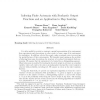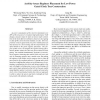201 search results - page 7 / 41 » Reducing the number of clock variables of timed automata |
PATMOS
2004
Springer
14 years 27 days ago
2004
Springer
Synchronization between independently clocked regions in a high performance system is often subject to latencies of more than one clock cycle. We show how the latency can be reduce...
FORMATS
2005
Springer
14 years 1 months ago
2005
Springer
In this paper, we study timed games played on weighted timed automata. In this context, the reachability problem asks if, given a set T of locations and a cost C, Player 1 has a st...
AAAI
1992
13 years 8 months ago
1992
It is often useful for a robot to construct a spatial representation of its environment from experiments and observations, in other words, to learn a map of its environment by exp...
ISVLSI
2007
IEEE
14 years 1 months ago
2007
IEEE
As power consumption of the clock tree dominates over 40% of the total power in modern high performance VLSI designs, measures must be taken to keep it under control. One of the m...
CONCUR
2006
Springer
13 years 9 months ago
2006
Springer
In regular inference, the problem is to infer a regular language, typically represented by a deterministic finite automaton (DFA) from answers to a finite set of membership querie...


